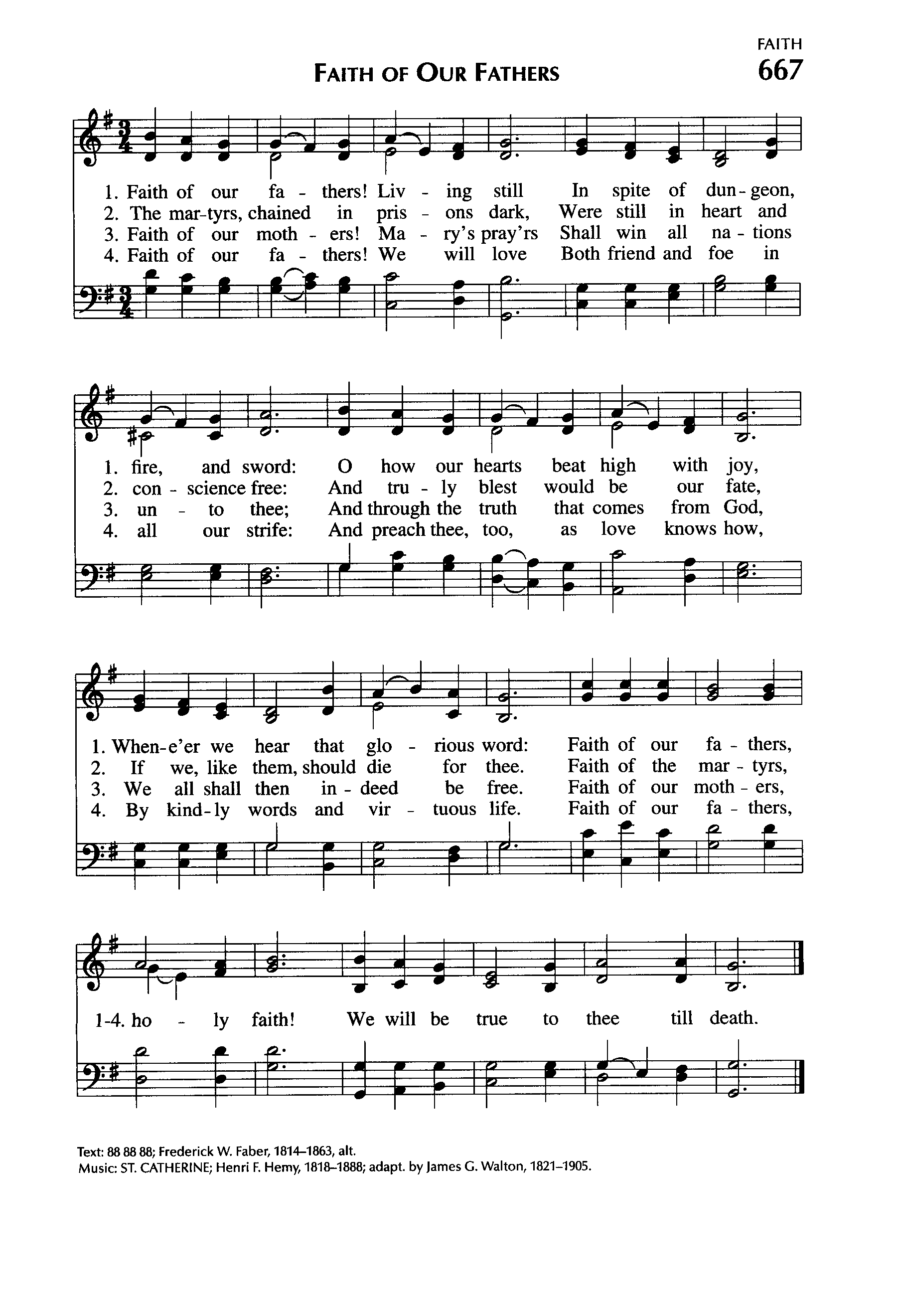Faith of Our Fathers
Lyrics
in spite of dungeon, fire, and sword;
oh, how our hearts beat high with joy
whene’er we hear that glorious word!
Faith of the martyrs, holy faith,
we will be true to thee till death.
were still in heart and conscience free,
and bless’d would be their children’s fate
if they, like them, should die for thee!
both friend and foe in all our strife,
and preach thee, too, as love knows how,
by saving word and faithful life!
Bible Reference
Psalm 22:4-5
About This Hymn
“Our fathers trusted in thee: they trusted, and thou didst deliver them.” — Psalm 22:4 (KJV)
Hebrews chapter 11 is often described as the great "hall of faith" — a stirring tribute to men and women throughout biblical history who demonstrated unwavering belief in God, often at great personal cost. Since the days of the early Church, believers have continued to face persecution, and throughout history, millions have suffered — even unto death — for their steadfast confession of Christ as Lord. Even in our modern world, where religious freedom is often taken for granted, many still endure hardship and martyrdom for their faith.
When Faith of Our Fathers is sung, it evokes powerful memories of these spiritual forerunners — the “great cloud of witnesses” described in Hebrews 12:1. Their enduring presence inspires the Church to run its race with perseverance. It serves as a vivid reminder that the Christian faith is rooted in a rich legacy of sacrifice and conviction. From the suffering of the early Christians under Roman rule, to the trials of the French Huguenots under King Louis XIV, and the quest for religious liberty that inspired the Pilgrims’ journey to the New World, the blood of martyrs has long been the seed of the Church.
The particular “fathers” referred to in this hymn are the Roman Catholic martyrs who died during the English Reformation in the sixteenth century. The hymn’s author, Frederick William Faber, was born on June 28, 1814, in Calverley, Yorkshire, England, and raised in a devout Calvinist home. His father, an Anglican clergyman, ensured he received a thorough theological education. After graduating from Oxford University in 1843, Faber was ordained into the Anglican Church and served a parish in Elton, England.
Although initially opposed to Roman Catholic doctrine, Faber was deeply influenced by the Oxford Movement, a religious movement within the Anglican Church that emphasized the Church’s Catholic heritage and called for a return to traditional liturgy, sacraments, and ecclesiastical order. This movement stood in contrast to the evangelical message of personal conversion popularized by the Wesleys, and it appealed to many high church Anglicans.
Under the influence of the Oxford Movement, Faber converted to Roman Catholicism after just three years in Anglican ministry. Upon his conversion, he adopted the name Father Wilfrid. He quickly observed that Catholic congregations lacked the rich tradition of hymn singing that he had experienced within Anglicanism. Drawing on his own musical and poetic abilities, he began composing hymns that would both educate and inspire Catholic worshipers. Faber eventually wrote more than 150 hymns, earning him high regard within the Church. In recognition of his contributions, the Pope awarded him a Doctor of Divinity degree. Faber died in 1863 at the age of 49.
Faith of Our Fathers first appeared in 1849 in Faber’s collection Jesus and Mary; or Catholic Hymns for Singing and Reading. The hymn was intended to honor the Roman Catholic martyrs who suffered under the rule of Henry VIII during the establishment of the Church of England. Faber hoped that such hymns would help keep alive the memory of those who died for their faith, and ultimately inspire England’s return to the Catholic Church. One of the lesser-known stanzas from the original version makes this hope clear:
Faith of our fathers! Mary’s prayers
Shall win our country back to thee;
And through the truth that comes from God,
England shall then indeed be free.
The melody most commonly associated with the hymn is known as “St. Catherine’s Tune.” It was composed by Henri F. Hemy, a devout Roman Catholic born in Newcastle-upon-Tyne, England, on November 12, 1818. Hemy was a respected church organist and composer, and in 1864 he published a Catholic hymnal titled Crown of Jesus. The tune was originally composed for a different hymn, St. Catherine, Virgin and Martyr, in honor of Catherine of Alexandria, a fourth-century Christian martyr.
In 1874, musician James G. Walton revised Hemy’s original tune and added the now-familiar refrain:
Faith of our fathers, holy faith!
We will be true to thee till death.
This musical setting helped secure the hymn’s popularity across a wide range of Christian denominations. While the hymn’s original text was distinctly Catholic in tone, many Protestant groups embraced revised versions that emphasized shared themes of perseverance, loyalty, and the courage of past believers.
Faber’s poetry consistently reflects his theological convictions and a deep sense of God’s mercy. Another of his well-known hymns, There’s a Wideness in God’s Mercy (written in 1862), expresses his heartfelt trust in the compassion and kindness of the Lord:
There’s a wideness in God’s mercy,
Like the wideness of the sea;
There’s a kindness in His justice,
Which is more than liberty.
…
For the love of God is broader
Than the measure of man’s mind;
And the heart of the Eternal
Is most wonderfully kind.
Through hymns like Faith of Our Fathers, Faber sought to connect the suffering of past saints with the struggles of contemporary believers. His work continues to remind the Church that true faith often involves sacrifice, but it is anchored in a God who is faithful to deliver, just as He did for our spiritual ancestors.


📬 Subscribe to Our Devotional Updates
Receive weekly hymns, devotionals, and website features directly in your inbox.
Hymn Information

- Category: Hymn
- Author/Writer: Frederick William Faber (1849)
- Added: June 12, 2025
- Last Updated: June 12, 2025
- Views: 2042
MIDI File
More Hymns by Frederick William Faber
Popular Hymns
Recent Blog Posts
Popular Blog Posts
Visit Us on Social Media
Latest from X (Twitter)
Tweets by HymnalLibraryLatest from Facebook
Latest on YouTube
Daily Bible Verse
Disclaimer
The hymns, sheet music, MIDI files, and related content on this website are provided for educational and research purposes only.
- Public Domain: Many of the hymns featured here are in the public domain and may be freely used.
- Copyrighted Works: Some hymns may still be under copyright protection. Where applicable, permission has either been requested from the copyright owner, or the content is shared under the principles of fair use for educational purposes.
⚠️ Important Notice: If you wish to reproduce, distribute, or use any copyrighted hymn beyond personal study or educational use, you must obtain permission directly from the copyright holder. This website does not grant any rights for commercial use yet.
If there is any other question please address it to us in our Contact Page, for further assistance. Thank you for using the site. May God Bless You.












